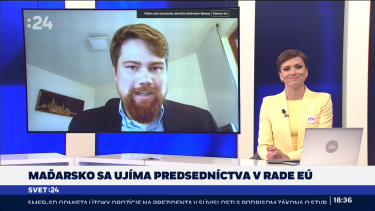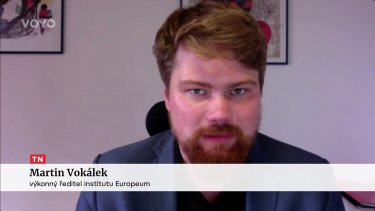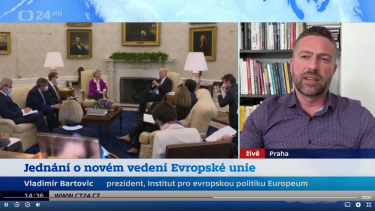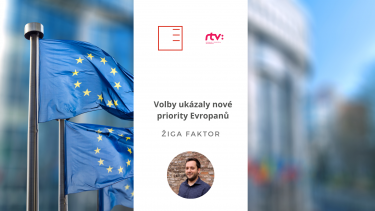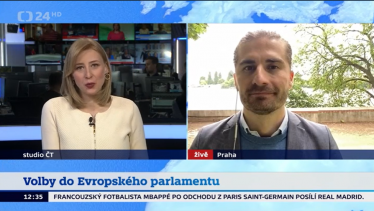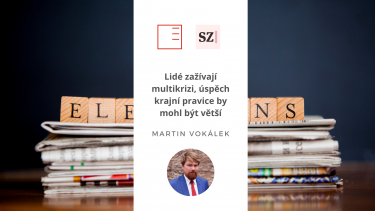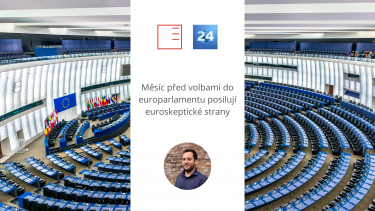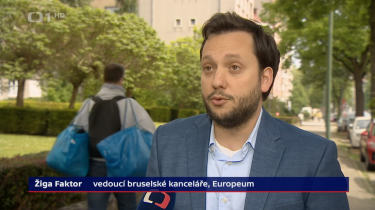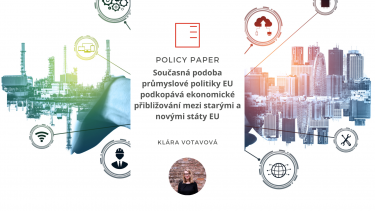WhatNews | Cities are expecting another heat wave this year. What is Prague doing to keep us from getting baked?
The average temperature in the Czech Republic has increased by 2.2 degrees Celsius since the 1960s. As a result of climate change, the country is suffering more frequent weather extremes: torrential rain, drought and heat. Heat waves are particularly severe in heat islands that form in cities. Prague wants to rapidly reduce greenhouse gas emissions, add greenery and water features. Will it be enough? Katarina Svitková, an Associate Research Fellow at EUROPEUM Institute gives examples to WHAT news on how Barcelona is adapting to the heat.
Zjistit více
RTVS | Hungary takes over the Presidency of the EU
From this day Hungary holds the Presidency of the EU. It takes over the Presidency from Belgium and will set the European agenda until the end of the year. The Hungarian Presidency says it wants to find real solutions to real problems. But some analysts fear that important issues, including support for Ukraine, could take a back seat. Martin Vokálek, executive director of EUROPEUM Institute, comments for RTVS.
Zjistit více
TV Nova | The far right wins the first round of parliamentary elections in France
The far-right National Rally of Marine Le Pen wins the first round of the early parliamentary elections in France. The foreign media are talking about the end of the Macron era, but he is not giving up and has called on the French people to vote against the far right. Martin Vokálek, executive director of EUROPEUM Institute, comments for TV Nova on what is driving voters to the far right and what the situation is in France.
Zjistit více
ČT24 | Negotiations on the new leadership of the European Union
Negotiations on the EU leadership positions will continue next week. On Thursday, leaders and presidents are due to make their final decision at a summit in Brussels. Vladimír Bartovic, President of EUROPEUM Institute, commented on whether Ursula von der Leyen will defend her post as President of the European Commission.
Zjistit víceRTVS | Elections show Europeans' new priorities
After the European Parliament elections, the two largest factions retained their positions. However, far right parties has made gains at the expense of the Liberals and Greens. It was significant in France, Germany, Austria and other Member States. Why more and more young people vote for them? Will the right-wing groups in the EP join forces? And how can they influence migration policy, support for Ukraine or the Green Deal? For RTVS programme Z prvej ruky comments Žiga Faktor, deputy director and head of the EUROPEUM Institute's Brussels office.
Zjistit více
ČT24 | The European Parliament faced one of the toughest periods. How did it cope with the challenges?
The concluding European Parliament experienced one of the toughest periods. It had to address challenges such as the COVID crisis, the war in Ukraine, the energy crisis, and the migration pact. How did the parliament deal with these complex issues? Viktor Daněk, Deputy Director of the EUROPEUM Institute, assessed the effectiveness of MEPs on a daily broadcast of ČT24.
Zjistit víceSeznam Zprávy | People experience multi-crisis, success of the far right could be greater
Despite the rise in support for the far right in most countries, the direction of the EU will not fundamentally change. The People's Party maintains its position as the strongest faction and gains support from centrist parties. The victory of the extreme right in the elections signals the strengthening of conservative and populist parties. However, it is expected that key issues such as the environment and migration will remain on the agenda. The election result does not signify a radical change but serves as a signal to focus on voters favoring conservative and far-right parties. Martin Vokálek, Executive Director of EUROPEUM Institute, commented on the results for Seznam Zprávy.
Zjistit více
ČT24 | Euroskeptic parties strengthen a month before the European Parliament elections
The European elections are about a month away. Czechs will vote for 21 of the 720 MEPs. This will be the first election since Brexit, the Covid-19 pandemic or the start of the Russian invasion of Ukraine. Turnout is expected to be higher than in the last elections five years ago, with right-wing and Eurosceptic parties strengthening. Žiga Faktor, deputy director and head of EUROPEUM Institute's Brussels office, described the possible reasons for daily broadcast of Czech TV.
Zjistit více
Události | Why is Euroskepticism and the far-right rising in EU elections?
In the forthcoming European elections, projections suggest that the European People's Party and the Socialists will likely hold their ground. However, a competitive scenario arises for the third spot as liberals confront rising of Eurosceptic and far-right parties. What drives voter behavior towards these political parties? Žiga Faktor, deputy director and head of EUROPEUM Institute's Brussels office, answered for main evening broadcast Události at Česká televize.
Zjistit více
Policy paper | Current EU industrial policy undermines economic convergence between old and new EU countries
The post-communist states of Central and Eastern Europe, including the Czech Republic, joined the European Union at the height of globalisation and the dominance of the so-called Washington Consensus policies. However, the global economic crisis of 2008 showed shortly afterwards that these policies had their limits. Read more in Klára Votavová's Policy Pepeu.
Zjistit víceStaroměstské náměstí 4/1
Praha 1 - Staré Město
110 00
tel.: +420 212 246 552
email: europeum@europeum.org
https://www.europeum.org

